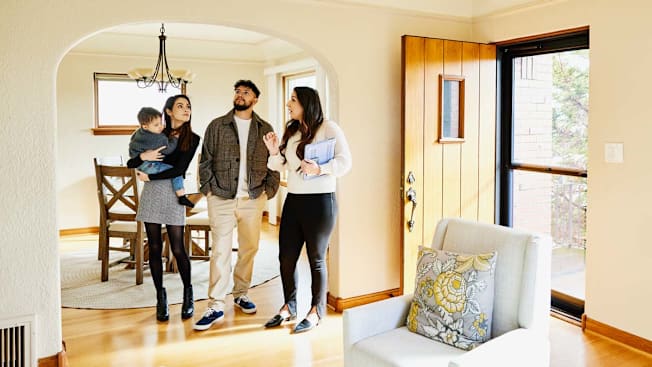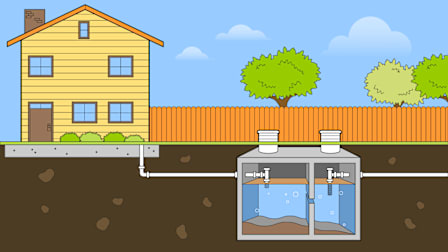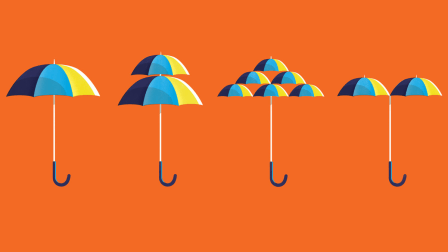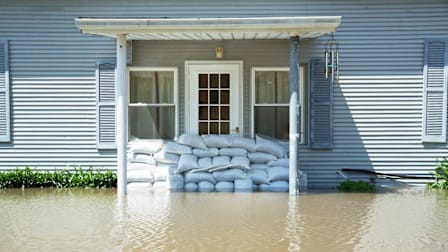What to Know Before Buying Your First Home in an Economic Crisis
Lessons I learned buying my first place during the Great Recession

When I bought my first house in 2010, at age 24, it was the Great Recession, and the housing market—the entire world, really—was off-kilter. A little like it is now.
I was newly married, a recent college grad, and I’d dreamed of getting my own place since I was a kid growing up in my parents’ one-bedroom, rent-controlled apartment in New York City. My wife and I, despite our modest incomes, had managed to squirrel away about $12,000. Armed with that meager down payment, patience, and a blithe willingness to see past any number of imperfections and economic uncertainty, we set out on our search.
It was terrifying. We had tens of thousands of dollars in student loan and credit card debt, which we were chipping away at on a household income of less than $100,000. That would be a lot in many parts of the country, but it didn’t get you very far in New York.
Be Optimistic
In a typical market, you’re at a disadvantage as a first-time homebuyer. You probably have less savings for a down payment, college debts, and maybe a sub-optimal credit score because you’ve got a shorter credit history and because your debt-to-income ratio is high. But, to be brutally honest, youth can be an advantage at a time when older buyers may feel safer sitting on the sidelines.
If you hold on to your first house for a while, chances are good it will be a smart long-term investment. Home values increase, on average, about 3 to 5 percent each year, though your location can make a big difference. Values in popular real estate markets recovered from the Great Recession after just a few years, and a full 80 percent of the market had recovered within a decade. And if you’re young, you’ve got the time. Plus, you’ve got less to lose. An existing owner may be locked in at a far lower interest rate, or, they may be worried about selling their own house. But chances are good rates will eventually come down. You may end up ahead by buying now, before prices go up further, then refinancing when rates eventually drop. Any significant rate drop is likely to be accompanied by a surge of interest from buyers, and in turn, higher prices.
Remember that fact, and let any concerns over short-term projections keep other buyers at bay.
Look Where Others Aren't
Don’t expect to be the lone shopper in San Francisco’s Mission District or the West Village of Manhattan. Instead, seek out undiscovered or unfamiliar neighborhoods. Most people aren’t natural risk-takers, and buying in an area that doesn’t have a lot of buzz—at a time of great uncertainty—is more than a lot of folks can stomach. It’s how I got a foothold in the real estate market.
"It’s almost always true that you’ll get more for your money if you leave a prime area," says Gina Lorenzo, a Realtor in the Charlotte, N.C., area. "In our area, if you’re willing to go 45 minutes outside the downtown, you can get a house for $350,000 that might be priced in the $600s nearer the heart of the city."
When I went house hunting in 2010, I already knew my $300,000 budget provided basically zero options in Manhattan because I’d been scanning local listings long before I could start shopping. Then I finally listened to a friend who kept gushing about a neighborhood in Jersey City, where my budget could get me a three- or four-bedroom house, possibly even a two-family with rental income, provided I was willing to do some heavy-duty renovation.
Granted, there were some harrowing moments in our hunt for houses in disrepair: I encountered backyards littered with beer bottles and syringes, and on one occasion, a pit bull chained to a staircase. I toured a 12½-foot-wide two-bedroom row house where I felt like I could practically touch the two opposing walls if I stretched out my arms; it was even more claustrophobic than the apartment I’d grown up in.
I saw close to 40 houses in six months before I found a place I wanted and a seller willing to accept my full-price offer secured by a modest 3.5 percent down payment. If I’d never extended my own search outside my dream Manhattan neighborhoods, I’d probably still be searching for my first house.
Be Flexible
In times of uncertainty, flexibility can be worth more to a seller than squeezing every last penny out of a sale. There are other ways you can sweeten the deal. You could accept a distant closing date, wait to have a home inspection until the seller is comfortable having people in her house, or even let them rent back the house from you.
As for me, I made two major concessions to the seller of my first house: I agreed to take over a four-year contract on the home’s security system, and I vowed to keep the existing tenants on the top floor for a year. That gave me a leg up over other buyers, including a couple who actually offered more money. (The tenants were identical twin boys who were professional hip-hop dancers, and they practiced at all hours of the night. Plenty of sleep was lost. But they’re now the two principal dancers for Ariana Grande, and if I hadn’t taken a chance, I probably would’ve missed out on any number of fascinating stories involving Janet Jackson, Kelly Rowland, and Nicki Minaj.)
Get Comfortable With Technology
During the pandemic, people got comfortable using services like digital notaries, and even performed closings via web conference. Technology is still your friend when it comes to being a competitive buyer in a tricky market. Agents I spoke to said the same thing. "I’m telling my first-time buyers to use every tool at their disposal, like maps, street views, and virtual showings," says Lorenzo, the agent in Charlotte. "Anything that can help you research a property and get ready to make an offer while some buyers may be sitting on the sidelines."
Virtual showings can help you get a decent sense of a house when you can’t go in person. If you like a house, you can do background research in advance about things like square footage, layout, schools, and taxes, so that when you schedule a showing, you can simply walk through and beat the competition by making an offer if the place shows as well in person as it did online. And bear in mind that you might still be able to see the house again during the home inspection, or at least know whether it’s in good shape from the inspection report—and rescind an offer if it has any major problems.
Use Your Agent to Your Advantage
Your agent is your advocate and your link to the seller. Make sure to find an agent you connect with, and who really takes the time to understand you. Particularly in an uncertain market, you need an agent who goes above and beyond. "I always like to say that, as agents, we deal in people more than we deal in real estate," says John Manning, a real estate agent in Seattle.
For instance, how well he knows a buyer informs how he videos a house, something he’s been doing to eliminate the need for initial showings. "If I know you detest popcorn ceilings, I’m going to make sure to get the ceiling from every angle," he says. "That kind of thing just has so much more credibility than an overproduced video you’d find online from a listing agent."
My own local agent, Kathy, has been invaluable with aspects beyond getting a good deal. For instance, she’s smoothed over permitting or certificate of occupancy issues with the town building department.
Fostering a good relationship with your agent can even give you a jump on listings. "On our brokerage platform, we can actually see future listings before they’re available to the public," says Lorenzo. And though an agent may not be able to share an entire listing before it goes public, they may be able to queue up a virtual tour by going early to shoot a video of the interior for you, or even prepare a tentative offer so that you can strike quickly once the house is listed.
Look for an agent who listens, without rushing you off the phone. Are they showing you houses that are in line with your budget and your needs? You want someone who stays in touch with you and alerts you to properties as soon as (or before) they come on the market. If you find someone who seems to be always encouraging you to make an offer on a house, find someone else—they just want to make a quick sale.
Consider Your Mortgage Options
Getting a mortgage can seem overwhelming to first-time buyers even during ordinary times. And we’ve now been waiting five years to see if interest rates will return to the lows they saw early in the pandemic.
Conventional wisdom says putting a 20 percent down payment on a 30-year fixed mortgage is the safest option when it comes to mortgages—you often get the lowest rates and your payments are the same every month for as long as you have the loan. But the reality is, first-time homebuyers typically don’t have that 20 percent down payment.
But there are loans that are geared to first-time homebuyers with small down payments. You have to pay mortgage insurance or PMI every month, though, which protects the bank in the event you default on your loan. The amount you pay in PMI varies depending on your loan terms, but generally, plan on paying .58 to 1.85 percent of the home’s cost, per year, until you have enough equity in your home to get rid of PMI. It’s crummy to have to pay that extra money, but on the other hand, it could take you decades to save a 20 percent down payment.
The trick I’ve used to my advantage more than once is to make a small down payment, then eliminate PMI quickly. That only works if you still have a sum of money left over after you close on your house. Let me explain.
If you put down a smaller amount—you can go as low as 5 percent with a conventional loan—you can use the money you saved on a down payment to fund a renovation. If you bought a fixer-upper and the renovation adds significantly to the value of your house, you can get the house re-appraised and ask the bank to drop the PMI.
Be Patient
Responsible me wants to remind you that even in the best of times, things can go wrong with real estate transactions. And they often do. Our best advice is to hire a seasoned real estate lawyer who can help you navigate these circumstances. He or she will be able to draw up contracts for any number of contingencies and protect you if circumstances change.
One last thought: There are reasons, far beyond financial practicality, that are equally important for buying a house. I felt stunted by renting. I wanted to renovate spaces and plant gardens, and build a basement workshop, none of which was possible as a renter. I wanted to put down roots but felt like rents would continue to climb forever, forcing me farther and farther from the city that I loved. So while you can research the future of the housing market, and mortgage rates, and the economy as a whole, endlessly, only you can gauge whether this is really the right time to buy your very first home.
That’s a deeply personal question, but I’ve always found that tumultuous times can bring about positive change in life, leading me to believe that a downturn, regardless of its cause, may be the best opportunity you’ll ever have to get your foot in the front door of your new home.




